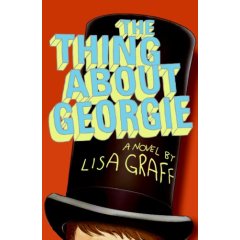Middle-Grade Reviews: Joseph and Georgie
and looking beyond differences
 June 5th, 2007 by Eisha and Jules
June 5th, 2007 by Eisha and Jules
Here are two co-reviews of two books by two first-time novelists (one, a proud member of the Class of 2k7, and the other, a proud member of The Longstockings). And we know that practically everyone else has covered The Thing About Georgie — particularly, around the time that Lisa Graff conducted her entertaining blog tour — but we’re just now getting to our review. Better late than never, right? . . .

by Rose Kent
HarperCollins Children’s Books
April 2007
(review copies)
This, Rose Kent’s first novel, is about fourteen-year old Joseph Calderaro, who was borne of a Korean woman but adopted as a wee babe into an Italian family. Considering himself “an ethnic sandwich,” he isn’t too terribly caught up in identity issues (he’s mostly consumed by the worries typical of children that age — girls, friendships, school, etc.), but when his teacher assigns a project in which the students must write about their heritage, he starts to become more aware of the holes in the story of his biological family and birth. His parents have little information about his birth, and his father almost refuses to discuss it, emphasizing that he became part of their Italian family and heritage the day they decided to adopt him. When a new Korean-American family move into the neighborhood, Joseph gets to know Yongsu, the boy of the family, and attempts to learn a bit more about Korean culture; however, when his own attempts to learn about his Korean mother fail, he eventually claims a famous Korean athlete as his grandfather for the class project. After his paper is chosen to be entered into a national contest, he must admit to his untruths. Eventually, Joseph’s parents come around and do what they can to help Joseph in his struggles to understand his heritage and learn more about Korean culture . . . The novel, with its light-hearted tone and well-placed doses of humor, is told with much honesty and earnestness. Its effectiveness as a touching story about international adoption and identity issues is coupled with the fact that the major issues of the book speak also toward the general angst and universal truths of any student that age (crushes, stress over class projects, fitting in at school, and more).
There are occasional missteps: Joseph’s crush reacts badly to the revelation of his dishonesty, and is thereafter dismissed as stuck-up and shallow, for example – seems a bit harsh. And really, why would any children’s book set in the present day mention the macarena? But generally, this is a fun read about a topic that’s bound to resonate with a lot of readers. A strong first effort – we’ll look forward to the next!

by Lisa Graff
Laura Geringer Books
(an imprint of HarperCollins)
January 2007
(review copy and library copy)
Lisa Graff’s first novel, another light-hearted and compassionate tale about standing out yet fitting in, is about a dwarf. Georgie may be in fourth grade yet the size of a toddler, but he adjusts just fine, particularly due to the efforts to which his musician parents have gone to make adjustments for Georgie in his life. He and his long-time best friend, Andy, have a dog-walking business, and — other than an occasional run-in with classmate Jeanie the Meanie — life is good. But then his parents announce that soon he will be a big brother, and Georgie just knows that the child will be average-sized and learn to play an instrument classically, as his parents do, something which Georgie’s small, stubby fingers simply won’t allow. To make matters worse, Andy invites Russ, a new friend, to join the dog-walking business, and — fearing that Russ will take Georgie’s position as best friend — he and Andy fight and stop speaking.
Like with Kimchi & Calamari, this book succeeds because the issues surrounding what makes Georgie unique – his dwarfism – are seamlessly interwoven with the kind of issues every kid that age deals with: jealousy over a friend’s new friend, unwanted attention from a weird classmate, anxiety over the changes in family dynamics that a new sibling brings, worries about meeting parents’ expectations… But the dwarfism is definitely an issue, and Graff doesn’t let us forget it. Every so often the third-person narrative from Georgie’s POV is interrupted by a first person narrator, who forces the reader to really imagine what it’s like living inside Georgie’s skin through concrete examples and “tests,” such as in this challenge that heads the second chapter:
I need you to do me another favor. I need you to sit down on the floor. Don’t worry if it’s a little dirty. You won’t be there too long.
Now stretch your legs out in front of you, and pull your knees up to your chest. Wrap your arms around your legs, and rest your head on your knees for a second. Then take a couple of deep breaths, in and out. It’s pretty relaxing to sit with you head on your knees like that, right? I bet you sit like that a lot, maybe when you want to think for a little bit or when you’re waiting for something to happen. You probably think that it’s no big deal, that everyone can do it.
Well, Georgie can’t.
It doesn’t bother him, really, not to be able to rest his head on his knees when he needs to do some thinking. But the thing is, he can’t. Even if he wanted to.
You can get up now.
And what’s particularly striking is that, towards the novel’s close, Graff uses these beginning-of-the-chapter “tests” to show us what Georgie can do — such as, play “Ode to Joy” with four glasses of water and a spoon. She has the reader try, ending with, “What? Having some trouble? Did you even try? You probably think it’s too hard. I bet you think it’s impossible even, that no one can do it. Well, Georgie can. Just thought you should know.”
It’s an effective technique, and stops just short of being intrusive. It also makes this one a great middle-grade read-aloud. And the reader gets a bit of a surprise at the novel’s very close, discovering just whose voice is behind these challenges.
Again, a great first effort. Here’s to what comes next from the pens of first-time novelists Kent and Graff . . .

I loved the narrator’s voice in Georgie: “You can get up now.”